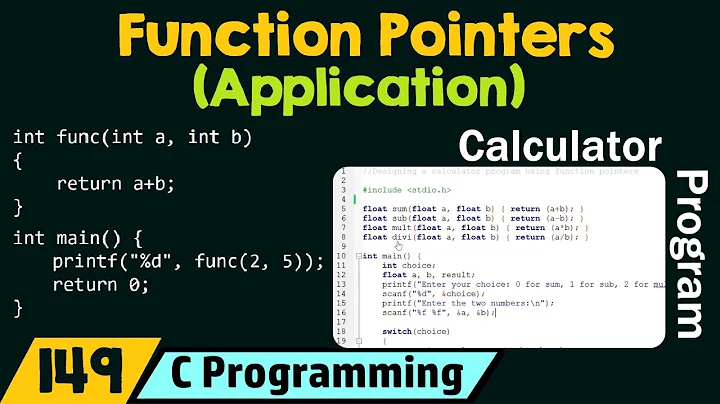Is it possible to add a function within a function?
Solution 1
Yes, it's possible.
It is even possible to nest a function within another function, although this is not very useful.
f1 ()
{
f2 () # nested
{
echo "Function \"f2\", inside \"f1\"."
}
}
f2 # Gives an error message.
# Even a preceding "declare -f f2" wouldn't help.
echo
f1 # Does nothing, since calling "f1" does not automatically call "f2".
f2 # Now, it's all right to call "f2",
#+ since its definition has been made visible by calling "f1".
# Thanks, S.C.
Source: The Linux Documentation Project
Solution 2
Yes, and this becomes clearer when you consider what a shell function really is.
For POSIX-compliant shells a function definition is standardized thus:
-
2.9.5 Function Definition Command
- A function is a user-defined name that is used as a simple command to call a compound command with new positional parameters. A function is defined with a "function definition command"... as follows:
fname() compound-command[io-redirect ...]The function is named
fname... The implementation shall maintain separate name spaces for functions and variables.-
The argument compound-command represents a compound command, as described in Compound Commands.
- When the function is declared, none of the expansions in Word Expansions shall be performed on the text in
compound-commandor<<&io-redirect&>; all${expansions}shall be performed as normal each time the function is called. Similarly, the optional<<&io-redirect&>redirections and anyvariable=assignmentswithincompound-commandshall be performed during the execution of the function itself, not the function definition. See Consequences of Shell Errors for the consequences of failures of these operations on interactive and non-interactive shells.
- When the function is declared, none of the expansions in Word Expansions shall be performed on the text in
And so, at its heart, a shell function named fname is a literal string composed of at least one compound command that the shell will call up from memory and execute in place of fname when it occurs in input in command position - which means wherever a cmd will do. This definition opens a lot of possibilities for the use of a function in a POSIX shell. Either of the following is acceptable:
fn() {
command; list;
fn() { : redefines itself upon first execution; }
}
...and...
fn() {
helper1() { : defines another function which it can call; }
helper2() { : and another; }
helper1 "$@" | helper2 "$@" #processes args twice over pipe
command "$@"; list; #without altering its args
}
But that is a small example. If you consider the meaning of compound command you might begin to see that the conventional fn() { : cmds; } form is only one way a function can work. Consider some different kinds of compound commands:
{ compound; list; of; commands;} <>i/o <i >o
(subshelled; compound; list; of; commands) <>i/o <i >o
if ...; then ...; fi <>i/o <i >o
case ... in (...) ...;; esac <>i/o <i >o
for ... [in ... ;] do ...; done <>i/o <i >o
(while|until) ...; do ....; done <>i/o <i >o
And others besides. Any one of the above should work like...
fname() compound list
...and from among those any that can be nested when not assigned as a function can still be nested even if defined as a command.
Here's one way I might write your function:
update_prof(){
cat >&3
read "${2-option}" <&3
case "${1-$option}" in
1) update_prof '' name ;;
2) update_prof '' age ;;
3) update_prof '' gender ;;
*) unset option ;;
esac
} <<-PROMPT 3<>/dev/tty
${1-
1. Update Name
2. Update Age
3. Update Gender
}
Enter ${2:-option}: $(
printf '\033%s' \[A @
)
PROMPT
Some notes about the above:
- The
readin update is subject to IFS and backslash interpretation. Robustly it could beIFS= read -r "$1"but I'm unsure how you wish those things to be interpreted. Look for other answers on this site for more and better information on that score. - The
printf '\033%s...in the here-doc assumes/dev/ttyis linked to a VT100 compatible terminal, in which case the escapes used should keep the here-doc's final newline from displaying on-screen. Robustlytputwould be used. doman termcapfor more information there.- Best is the VT100 assumption is correct and you can do without either
printfortputby entering the escape characters literally into the here-document like^V{esc}[A^V{esc}@where^Vis a way of representing theCONTROL+Vkey combination and{esc}is your keyboard'sESCkey.
- Best is the VT100 assumption is correct and you can do without either
The above function will pull double duty depending on its parameter set - it will execute twice and re-evaluate its prompt only as required - and so it doesn't need a second function - because it can do both as long as it is initially called without parameters in the first place.
So if I run...
update_prof; printf %s\\n "$name"
The ensuing terminal activity looks like:
1. Update Name
2. Update Age
3. Update Gender
Enter option: 1
Enter name: yo mama
yo mama
Solution 3
You can define a function anywhere the shell is expecting a command, including in a function. Note that the function is defined at the moment the shell executes its definition, not when the shell parses the file. So your code won't work if the user chooses option 1 the first time update_profile is executed, because when update_name is called in the case statement, the definition of the function update_name won't have been executed yet. As soon as the function update_profile has been executed once, the function update_name will also be defined.
You need to move the definition of update_name before the point where it is used.
Defining update_name inside update_profile isn't particularly useful. It does mean that update_name won't be defined until the first time update_profile is executed, but it will remain available afterwards. If you want update_name to be available only inside update_profile, define the function inside it and call unset -f update_name before returning from the function. You won't really gain anything by doing that though, compared to doing the simple thing and defining all functions globally.
Related videos on Youtube
Zac
Updated on September 18, 2022Comments
-
Zac over 1 year
Here is my code:
function update_profile { echo "1. Update Name" echo "2. Update Age" echo "3. Update Gender" echo "Enter option: " read option case $option in 1) update_name ;; 2) update_age ;; 3) update_gender ;; esac function update_name { echo "Enter new name: " read name } }Just want to make sure if it's possible to do this way. I do know that I can throw all the codes into the case, but it will be messy, so I was thinking to create a stand alone function, within a function, and to be called when needed to perform its commands.
-
Zac over 9 yearsthinking of using it so that i would not have so much codes in the case, will try your answer, thanks
-
 mikeserv over 9 yearsA more simple means of handling the
mikeserv over 9 yearsA more simple means of handling theunset ...stuff is just to dofn() ( : ... ; ) -
 Gilles 'SO- stop being evil' over 9 years
Gilles 'SO- stop being evil' over 9 yearsunset -f update_nameis not only simpler thanupdate_name () ( : ... ; )or the less weirdupdate_name () { :; }but more importantly it does what it's supposed to do, which is to undefine the function.update_name () (…)defines a function which does nothing, so runningupdate_namewill do nothing instead of calling the external command by that name. -
 mikeserv over 9 yearsweird is a little silly. Moreover, what I meant was:
mikeserv over 9 yearsweird is a little silly. Moreover, what I meant was:fn() ( fn2() { : define helper; }; do stuff; helper )where the function is defined to run a subshell. There's nothing weird about that - a function is a named compound command (with new positionals) and not much else. So if a function is defined to run in a subshell from the start - you don't have to clean up its state when it closes. -
 Stéphane Chazelas over 9 yearsNote that in the Bourne shell (and all other Bourne-like shells except
Stéphane Chazelas over 9 yearsNote that in the Bourne shell (and all other Bourne-like shells exceptbash,yashand recent versions ofposh), you define a function by stickingfname()in front of any command, not just compound ones. Last time I asked, nobody could tell me why POSIX changed that to compound only.bashinitially only supportedf() { ...; }. -
 mikeserv over 9 years@StéphaneChazelas - no kidding - never even tried that. Just checked it and it works with
mikeserv over 9 years@StéphaneChazelas - no kidding - never even tried that. Just checked it and it works withdash.posh's parser doesn't handle even any compound command though:posh -c 'fname() if :; then echo not broken; fi; fname'results in a syntax error. Alsozshscrews upfname() { : ; } <redirectunless the compound form is a subshell. Can I ask though - isn't this then worth an upvote? Or what improvement is necessary to make it so? You might also have missed upvoting your own contribution as quoted in jherran's answer, I think... -
 Stéphane Chazelas over 9 yearsThough interesting, that's not really answering the question.
Stéphane Chazelas over 9 yearsThough interesting, that's not really answering the question. -
AdminBee about 4 yearsWelcome to the site. Please note that the comment "although this is not very useful" is a quote from the corresponding page in the Linux Documentation Project, and not necessarily the opinion of the post author. It would rather seem that this line was included as reference for the statement "Yes, it's possible", and that the part you may have considered judgemental was included for completeness.
-
prenex about 4 yearsHmmm I indeed did not know about that it is quoted from Linux Documentation Project so it might be useful indeed to include here that it might have sounded judgemental even though it might have been just a quote. I still find it an awsome feature.
-
AdminBee about 4 yearsI don't intend to contradict you on that; if you have found good use for it then it is a useful feature. Only sometimes heated discussions get started because contributors consider statements as unjustified, so I felt it was mandated to put the original comment on the usefulness "into context" ;)
-
Pourko about 3 years@Gilles 'SO- stop being evil' I was hoping that a function within a function would be visible only within that function, something like a local variable. Your suggestion to unset it before exiting the finction achieves exactly that effect. Thanks.
-
 Matthaeus Gaius Caesar over 2 yearsThis is extremely useful for hiding a set of functions until needed.
Matthaeus Gaius Caesar over 2 yearsThis is extremely useful for hiding a set of functions until needed. -
 jamiet about 2 yearsNot sure I agree with the docs. For layout of code, when f2 will only be called from f1 this can be VERY useful. Just my twopenneth
jamiet about 2 yearsNot sure I agree with the docs. For layout of code, when f2 will only be called from f1 this can be VERY useful. Just my twopenneth





